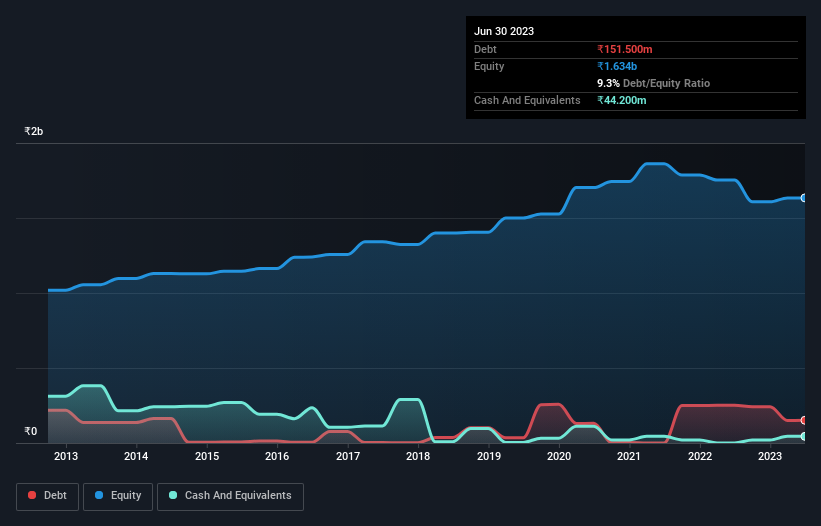Would Mahindra EPC Irrigation (NSE:MAHEPC) Be Better Off With Less Debt?
The external fund manager backed by Berkshire Hathaway's Charlie Munger, Li Lu, makes no bones about it when he says 'The biggest investment risk is not the volatility of prices, but whether you will suffer a permanent loss of capital.' It's only natural to consider a company's balance sheet when you examine how risky it is, since debt is often involved when a business collapses. Importantly, Mahindra EPC Irrigation Limited (NSE:MAHEPC) does carry debt. But is this debt a concern to shareholders?
Why Does Debt Bring Risk?
Debt is a tool to help businesses grow, but if a business is incapable of paying off its lenders, then it exists at their mercy. Ultimately, if the company can't fulfill its legal obligations to repay debt, shareholders could walk away with nothing. However, a more usual (but still expensive) situation is where a company must dilute shareholders at a cheap share price simply to get debt under control. Of course, debt can be an important tool in businesses, particularly capital heavy businesses. The first step when considering a company's debt levels is to consider its cash and debt together.
Check out our latest analysis for Mahindra EPC Irrigation
What Is Mahindra EPC Irrigation's Debt?
You can click the graphic below for the historical numbers, but it shows that Mahindra EPC Irrigation had ₹151.5m of debt in March 2023, down from ₹251.9m, one year before. However, it also had ₹44.2m in cash, and so its net debt is ₹107.3m.

A Look At Mahindra EPC Irrigation's Liabilities
Zooming in on the latest balance sheet data, we can see that Mahindra EPC Irrigation had liabilities of ₹892.5m due within 12 months and liabilities of ₹5.20m due beyond that. Offsetting these obligations, it had cash of ₹44.2m as well as receivables valued at ₹1.44b due within 12 months. So it can boast ₹585.8m more liquid assets than total liabilities.
This excess liquidity suggests that Mahindra EPC Irrigation is taking a careful approach to debt. Due to its strong net asset position, it is not likely to face issues with its lenders. There's no doubt that we learn most about debt from the balance sheet. But you can't view debt in total isolation; since Mahindra EPC Irrigation will need earnings to service that debt. So if you're keen to discover more about its earnings, it might be worth checking out this graph of its long term earnings trend.
In the last year Mahindra EPC Irrigation had a loss before interest and tax, and actually shrunk its revenue by 2.1%, to ₹2.2b. That's not what we would hope to see.
Caveat Emptor
Importantly, Mahindra EPC Irrigation had an earnings before interest and tax (EBIT) loss over the last year. Indeed, it lost ₹94m at the EBIT level. Looking on the brighter side, the business has adequate liquid assets, which give it time to grow and develop before its debt becomes a near-term issue. But we'd be more likely to spend time trying to understand the stock if the company made a profit. So it seems too risky for our taste. There's no doubt that we learn most about debt from the balance sheet. But ultimately, every company can contain risks that exist outside of the balance sheet. To that end, you should learn about the 2 warning signs we've spotted with Mahindra EPC Irrigation (including 1 which can't be ignored) .
If you're interested in investing in businesses that can grow profits without the burden of debt, then check out this free list of growing businesses that have net cash on the balance sheet.
New: Manage All Your Stock Portfolios in One Place
We've created the ultimate portfolio companion for stock investors, and it's free.
• Connect an unlimited number of Portfolios and see your total in one currency
• Be alerted to new Warning Signs or Risks via email or mobile
• Track the Fair Value of your stocks
Have feedback on this article? Concerned about the content? Get in touch with us directly. Alternatively, email editorial-team (at) simplywallst.com.
This article by Simply Wall St is general in nature. We provide commentary based on historical data and analyst forecasts only using an unbiased methodology and our articles are not intended to be financial advice. It does not constitute a recommendation to buy or sell any stock, and does not take account of your objectives, or your financial situation. We aim to bring you long-term focused analysis driven by fundamental data. Note that our analysis may not factor in the latest price-sensitive company announcements or qualitative material. Simply Wall St has no position in any stocks mentioned.
About NSEI:MAHEPC
Mahindra EPC Irrigation
Manufactures, sells, and markets micro irrigation systems in India and Uganda.
Adequate balance sheet and slightly overvalued.
Market Insights
Community Narratives



